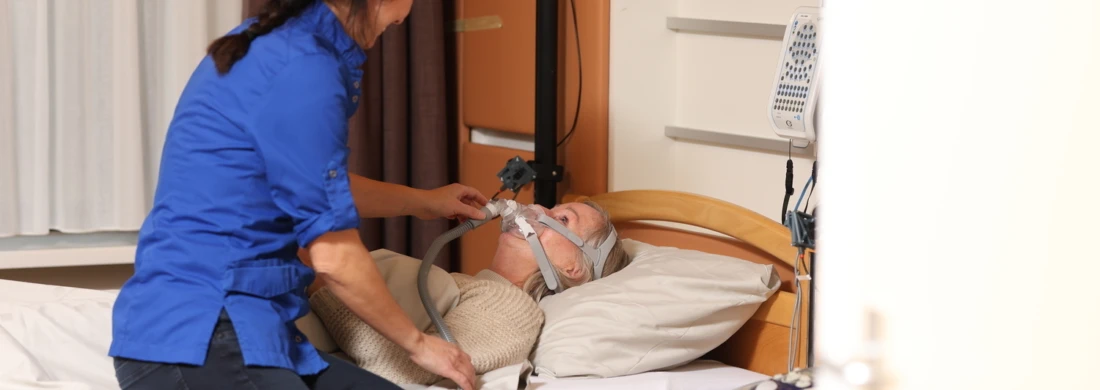Most patients at the Center for Sleep Medicine at Kempenhaeghe struggle with a complex sleep problem. In some of these patients, excessive sleepiness is caused by multiple factors or conditions. For others, diagnosis and treatment require more intensive or specialized care than a general hospital can provide.
The Center for Sleep Medicine offers specialized diagnostics and treatment for patients with narcolepsy and other forms of central hypersomnia, with a focus on symptom management and improving the patient's quality of life.
Central Hypersomnia (Including Narcolepsy) in Adults
Central hypersomnia is a group of sleep disorders in which excessive daytime sleepiness is the primary complaint, without being caused by insufficient sleep or another sleep disorder. The most common forms of central hypersomnia include:
- Narcolepsy: A neurological disorder in which individuals can fall asleep at inappropriate times, often accompanied by cataplexy (sudden muscle weakness), sleep paralysis, and hypnagogic hallucinations (vivid dreams or hallucinations while falling asleep or waking up).
- Idiopathic hypersomnia: A condition in which patients also experience extreme daytime sleepiness but without the additional symptoms of narcolepsy, such as cataplexy.
Diagnosis of Narcolepsy and Idiopathic Hypersomnia
- Multiple Sleep Latency Test (MSLT): A standardized test to measure how quickly a person falls asleep during the day. It is often conducted after polysomnography (PSG) to assess the level of sleepiness and differentiate between different forms of hypersomnia.
- Polysomnography (PSG): This sleep study records brain activity, breathing, and other physiological signals to rule out other causes of sleepiness, such as sleep apnea.
- Blood tests and cerebrospinal fluid analysis: In some cases, blood tests are performed to identify genetic markers, such as HLA typing, or cerebrospinal fluid is analyzed for the presence of hypocretin, a neurotransmitter that is often deficient in narcolepsy.
Treatment of Narcolepsy and Idiopathic Hypersomnia
- Medication: Treatment for these conditions is not curative but focuses on symptom management. Medications such as stimulants (e.g., modafinil or methylphenidate) are used to reduce daytime sleepiness. In some cases, antidepressants are prescribed to manage cataplexy.
- Lifestyle advice: In addition to medication, patients receive guidance on sleep habits and lifestyle adjustments to better control symptoms.
- Multidisciplinary support: Patients receive care from a team of specialists, including neurologists, psychologists, and nurses. They assist in managing the impact of the disorder on daily life, including work and social relationships.
Central Hypersomnia in Children
Hypersomnia, including narcolepsy, also occurs in children. However, its presentation can differ from that in adults. Symptoms may be less typical, making diagnosis more challenging. Early recognition is important, as the condition can have a significant impact on a child's development and learning.
Diagnosis and Treatment in Children
- Polysomnography (PSG) and Multiple Sleep Latency Test (MSLT): In children, a PSG is also followed by an MSLT to establish the diagnosis.
- Symptom management: Treatment focuses on symptom control, often using the same medications as in adults but adjusted to the child's age.
- Support for parents and children: Since hypersomnia can significantly impact a child’s development, parents and children receive intensive guidance from a multidisciplinary team, including pediatricians, psychologists, social workers, and educational support specialists.
Multidisciplinary Approach to Hypersomnia
The Center for Sleep Medicine offers a holistic treatment for both adults and children with hypersomnia. In addition to medical treatment, there is extensive attention to the psychological and social impact of these conditions. Treatment includes:
- Understanding the condition: Helping patients cope with the disorder and its implications in daily life, such as work or school.
- Multidisciplinary support: Physicians, psychologists, social workers, and nurses work together to optimize treatment and guidance.
Kleine-Levin Syndrome
This is a rare form of central hypersomnia that is also treated at the Center for Sleep Medicine. Patients with Kleine-Levin syndrome experience periods of extreme sleepiness, often accompanied by behavioral changes, disorientation, and hyperphagia (excessive appetite). The diagnosis is based on clinical presentation and sleep studies.
